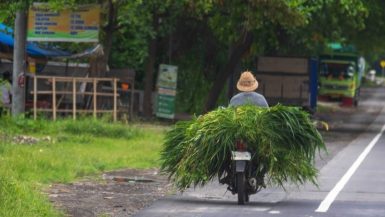
From unique beaches to fantastic surf breaks, from misty mountains to majestic temples and mouthwatering food on top, there are many reasons why Bali is the most popular Indonesian island of all. However, the tropical climate that you’ll experience here doesn’t only bring hot temperatures. It also means there are lots of irritating bugs buzzing around the place. So, what about mosquitoes in Bali?
Let’s face it, you are probably in the minority if you like these tiny insects that feed on human blood! Most people find them annoying, but the truth is that Balinese mosquitoes can be responsible for much more than just an itchy bite – they can carry serious diseases.
In this guide to mosquitoes in Bali, we’ll give you in-depth information about everything you should know about these tiny insects. We’ll talk you through the prevalence of mozzies and the possible dangers that they carry with them. You’ll also learn how to avoid them and minimize the risk of getting bitten.
Are there mosquitoes in Bali?

If you’re wondering whether there are mosquitoes in Bali, we’ve got some bad news: Yes, there are. In fact, there are lots of mozzies all around the island. After all, these little buzzy things thrive in tropical climates, and Bali has just that.
If you’re one of the unlucky folks who always attracts plenty of itchy bites all over their body, then this info could be enough to put you off traveling to the wonderful Island of Gods altogether. However, you shouldn’t worry too much about these irritating insects, as there are plenty of ways to keep them away and minimize the negatives.
One thing you should know about Balinese mosquitoes is that they can bite no matter the time of the day. They might get you while you’re having your nasi goreng rice for lunch or when you’re enjoying your evening drinks during sunset over Ulus. There are two main types of them. Some thrive during the midday and others during the evenings. Luckily, though, they rarely fly around the beaches, so there’s probably no need to spray smelly repellents on top of that sunscreen.
Are mosquitoes in Bali dangerous?

Although most mozzie bites in Bali don’t usually result in much more than a red, itchy mark on your skin, there are reasons why these little insects should be considered dangerous. The main one is that they can transmit serious diseases that could potentially cause severe health problems and sometimes even death. That’s not to say you should panic as soon as notice a mosquito bite, since getting really sick is rare. It’s just worth minimizing the risk by using repellents or relevant clothing that will cover up your skin.
The most common mosquito-borne diseases in Bali include dengue fever, Zika virus, and chikungunya. All of those give relatively mild symptoms but sometimes turn out to be more severe or even life-threatening in extreme cases. Fever and joint pains are among the typical warning signs indicating the possibility of a dengue or chikungunya infection. Both of these are especially dangerous to children and the elderly, so those people should be especially careful.
Zika virus, on the other hand, is typically a mild sickness but can affect pregnant women. That means it’s worth consulting your doctor before traveling to Bali if you’re expecting a baby. Luckily, the risk of malaria is very low in Bali.
The other reason mosquitoes in Bali can be dangerous is that the bites can sometimes get infected, especially when scratched. That means it’s worth using cremes that you can get in Balinese pharmacies to minimize the itchiness and swelling. They will also help them heal faster.
Where are mosquitoes in Bali?

Mosquitoes can be found throughout the island of Bali, but there are some places where they’re more prevalent. They breed around standing water, which means that the closer you are to a source of H2O, the more likely you’ll be at risk of getting bitten.
You’ll notice that much of the island is taken up by rice paddies, which, incidentally, are perfect grounds for mozzies to lay their eggs. There are also often high concentrations of them around swimming pools, ponds, and lakes.
Luckily, beaches are not too much of a worry when it comes to mosquitoes, because the winds usually keep them away from the shore. That’s not to say that you can’t be bitten if you stick close to the sea. Just that it’s not as likely as further inland.
How to avoid mosquitoes in Bali?

Avoiding mosquitoes altogether in Bali might be difficult, but there are many ways to minimize the risk of getting bitten and decrease the chances of getting any mozzie-related diseases. There are loads of good repellents out there that will help you keep the insects away. You should spray these on exposed parts of your body, especially around the ankles, where you’re likely to get more bites. It’s also worth wearing covering clothing, although that’s sometimes not an easy task in that scorching Balinese heat!
Choosing the right accommodation is also a good way to avoid mosquitoes in Bali. Airconditioned rooms are generally less likely to let insects inside, and many places also offer protective nets around the bed. Many high-end hotels will also spray their outside areas with special repellants and often provide free outdoor coils that should help keep insect numbers to a minimum. It’s also important to stay in a place that frequently cleans the swimming pool area if there is one, so they don’t become mosquito breeding grounds.
When should I visit Bali to avoid mosquitoes?

Unfortunately, no matter what time of the year you decide to visit this beautiful Indonesian island, you won’t be able to avoid the mosquitoes. That said, there are fewer of them during certain times, so if you’re one of those people favored by these biting insects, you should choose your season wisely. However, always stay vigilant and use protective measures whenever you choose to visit the Island of Gods.
There are two seasons in Bali – wet and dry. You will notice more mosquitoes during the rainy season, which lasts from October till March. That means the best time to visit the island to minimize the risk of getting bitten by insects is from April until September, the months that are incidentally the most reliable for good weather and surf. Avoiding the monsoon will also mean that ocean water will be clearer, so you won’t see so much rubbish polluting the beaches.
How to treat mosquito bites in Bali?

Seeing the first mosquito bite in a tropical country might cause some stress to first-time visitors. After all, these tiny little insects can carry serious diseases that could do a lot more harm than just ruin your holiday. However, there is no need to look for a doctor if you notice a red, itchy spot. It doesn’t necessarily mean you will get sick after one or even 20 bites! In fact, millions of tourists visit Bali every year, and most trips end trouble-free. The truth is that mozzie bites are very common so getting one while traveling around this Indonesian island is almost inevitable.
So, how do you treat mosquito bites in Bali? There is actually no need to do anything for those itchy bumps to heal. They should disappear on their own within a couple of days. It might be hard to resist the temptation to scratch them, but trust us, it’s worth leaving them alone! Scratching will only mean these small bites will last longer, and they might even get infected. You can get antihistamine creams or tablets that should help make it less irritating overall.
The best mosquito repellents for Bali.

Whether you’re coming from the US, Europe, or other non-tropical parts of the world, it’s likely that you don’t need strong repellents for mosquitoes at home. Unfortunately, Balinese mozzies are quite resilient, so it’s good to know what stuff works best to keep them away.
The most effective sprays are those containing some levels of DEET. It’s an active ingredient that will help not only to keep away mosquitoes but also other biting bugs such as fleas and ticks. It’s very strong stuff, so overdoing it might cause skin irritation and rashes. You can also get some less-offensive products that contain citronella or picaridin, but these are generally thought to be less potent against the fliers.
Mosquito repellents are widely available in shops around Bali. That said, smaller shops such as Circle K might not have a huge choice of products and often have only one type on offer. We recommend bringing enough sprays from home to last you throughout your trip, so you can get the most trusted and effective stuff available.
Mosquitoes in Bali – the conclusion.
If you’re among the vast majority of people that aren’t fond of these buzzy bugs, we’ve got some bad news for you – there are lots of mosquitoes in Bali. These tiny insects thrive in humid, tropical climates such as the one in Indonesia, which means the chances are you will get at least a few itchy bites during your travels.
However, Balinese mosquitoes can carry serious diseases, so you should make effort to avoid these small biters as much as you can. There are lots of effective repellents available, so make sure to use them on the exposed parts of your body. There are generally fewer mozzies during the dry season, too, which is worth thinking about. We can also recommend choosing accommodation that comes with protective nets and air-conditioning to minimize the risk of getting bitten while you sleep.


